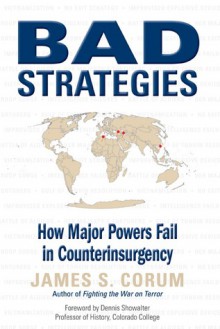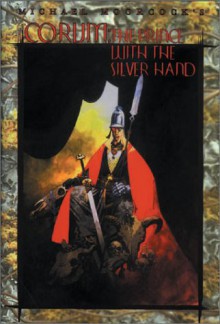
Moorcock has a reputation among fantasy editors for the speed with which he can turn out a story--call him and tell him you have a slot in an upcoming anthology that need filling, and he'll send you something the next day. It reminds me of an old truism in writing: if you never seem to be able to finish anything, then you're too critical of yourself, but if you are finishing things constantly, then you probably aren't critical enough.
That isn't to suggest that Moorcock has a swell head--from everything I've heard, he's a pleasant, self-effacing fellow--but that perhaps sometimes, his pen ends up working faster than his brain. I'd heard that the ideas he begins to touch upon in early works like Elric don't start coming into their own until later pieces, like Corum or Von Bek--which was why I was surprised that a number of elements in Corum felt less sophisticated than their treatment in Elric.
Unlike Elric, Corum doesn’t maintain his internal conflict throughout. Though he comes from an artistic, intellectual, peaceful background originally, this doesn’t really color his later actions or thoughts. Once the ‘badass warrior switch’ is flipped, that seems to be it, and he’s onto his new life. Certainly, there is a sense that he wants this to be over with, so he can return to a state of peace, but one would expect that his former life would change the way he approaches being a sword-weilding demon fighter, but it simply doesn’t seem to.
Doubtless, there was plenty of reason for the character to change--his whole life, everything he knew was ripped away from him--but I still would have liked to see that transformation play out, to see the contradiction between how his expectations and assumptions just don’t match the world around him, and the life he is forced into living. The whole story of his race is that they are ancient, wise, but naive and out of touch, and it would have worked better to see more of that in Corum, instead of the ‘take it as it comes’ style of the average sword and sorcery hero.
Likewise, the romance, while a central part of the story, is dealt with in a rather perfunctory fashion. We don't really see how the characters fell in love, or why this particular relationship formed, and so it ends up feeling less personal and more like a plot point--especially when compared to something like Dancers at the End of Time--but then, that was an occasion where Moorcock really took the time to get into the characters heads, to let the romance develop over the course of several books, and to explore the conflicting feelings at its heart.
Of course, it's not quite a fair comparison to make, since in that series, the romance really is the central plot, while here, as important as it might be to Corum's character, it's still secondary to the massive multi-dimensional conflict that takes center stage. It's unfortunate, because by focusing on that, he really could have separated Corum from Elric, who hardly has much time for sentiment.
The introduction of the dimension-hopping heroes' companion in book two didn't work especially well, either--like in Leiber's Swords of Lankhmar , the series suddenly takes an odd left turn, introducing this silly dimensional traveller who suddenly starts explaining the makeup of the universe and other such dull exposition.
We were reading a story about a man embroiled in a great conflict, but also a personal one--trying to avenge the death of his family, the only life he’d ever known, who has since become bitter and broken through struggle, but who has also found love, and keeps fighting for the sake of that love. To have this secondary character burst in with a completely different voice and tone, insisting that Corum is just one of many distracts from his story, cheapens his struggle, and makes the whole thing feel oddly goofy, especially compared to the opening book.
From there on, especially as we go into the third book and near the climax proper, the story becomes more piecemeal, where each scene begins to feel more like a self-enclosed event. It’s very much the cliche pulp approach, where this happens, then this happens, and we’re technically moving forward toward the final conflict, but the individual episodes aren’t placed in a meaningful order. It brings to mind the old writing adage that every scene should be followed by a ‘but’ or ‘therefore’ which connects it directly to the next scene. It’s not enough that they’re simply given to us in a certain order, they must be reliant on each other, there must be a sense of build, of inevitability, of meaningful connection from moment to moment.
The writing likewise vacillates in quality, from the flat exposition of the prologue to the quite visceral and imaginative scenes in the palace of the horrid chaos god Arioch at the end of book one--which indeed, are much more effective than the climaxes of the next two books, making them feel rather underwhelming in comparison.
But for all that, I can see why people find Corum to be an expansion on Elric, because there is one very real way that Moorcock is pushing the envelope here: the shifting dimensions, the alternate realities and identities, and layers of contradictory worlds are a great way to push the boundaries of what fantasy is, and how it operates--and yet, I'm reluctant to give Moorcock his due here as the self-defined 'bad writer with big ideas', because these aren't quite ideas.
What he's doing here is playing with form and structure, with the symbols that authors use to explore their ideas--but he's not creating themes and concepts beneath these symbols to hold them up and give them meaning. Magic is a symbol, and there are many different ways magic can be presented, and many ideas we can explore through our magic. However, far too many authors are content to simply produce complex magic systems without ever bothering to connect them to meaningful themes and ideas.
As other authors have proven in later books, like Viriconium and Bas-Lag--or even games like Planescape-Moorcock's symbolic innovation provides an exceedingly rich field of play for any writer to explore and represent a plurality of ideas--but unfortunately, Moorcock himself does not do much with them here.
Likewise, his focus on law vs. chaos instead of good vs. evil presents a number of interesting opportunities, from entropy and the Social Contract to the nature of the creative spirit, itself--but again, he's not pushing these representations very far.
It's the same problem he has in Dancers at the End of Time: he's given us a very strange and complex world, but the characters and themes in the book just aren't strange enough to match it. The structure Moorcock presents, wherein different individuals from various times and dimensions might come together, and that some of those individuals are really the same person, expressed in a different age--that’s quite interesting, but it’s also disappointing that he doesn’t do more with it. What does it mean for one person to meet a different version of himself? How does that feel, how does it affect him, moving forward? It should certainly offer some profound insights, or at least force us to confront some common preconceptions.
Likewise, it’s a great opportunity to explore the nature of storytelling, itself--the fact that we authors do keep writing about these similar kinds of figures, who really do feel like ‘versions’ of the same hero, or love interest, or villain--one begins to imagine the way that Gaiman would approach it. Once again, it’s something that Harrison spends a great deal of time exploring in Viriconium, where the same plot and characters are destined to recur, over and over again, but with such different pacing, voice, and tone that it becomes clear that these standard forms and types are really not the heart of the story--that indeed, they become almost superfluous.
After all, think of all the various stories in any medium, books, movies, comics, that play out pretty much exactly the same, whether they take on the form of the monomyth or the murder mystery or any other, with the same standard character types (hero, sidekick, wise man, love interest, villain, henchmen)--and then realize that this has nothing to do with the quality of the work. It’s all the other stuff that makes it good, that makes it feel original--or fails to.
The fact that, to combine their powers together, the characters are compelled to link arms and form a sort of cosmic kickline certainly does not help to make the experience feel as profound and strange as meeting an amoral albino version of yourself ought to--and really, what else is a good fantasy book but an opportunity to meet a version of yourself you'd never previously imagined could exist?
In the end, Moorcock gives us a blueprint for what the curious future of fantasy might look light, but sadly, it's largely inspirational because it invites other writers to fill in the holes he's left in his story, to take that huge, complex symbolic structure and really make it do some of the heavy lifting--and happily, they best fantasists of the modern era have done precisely that--but it's still a bit disappointing that Moorcock himself didn't sit down and take the time to give us his version of it.

 Log in with Facebook
Log in with Facebook 










